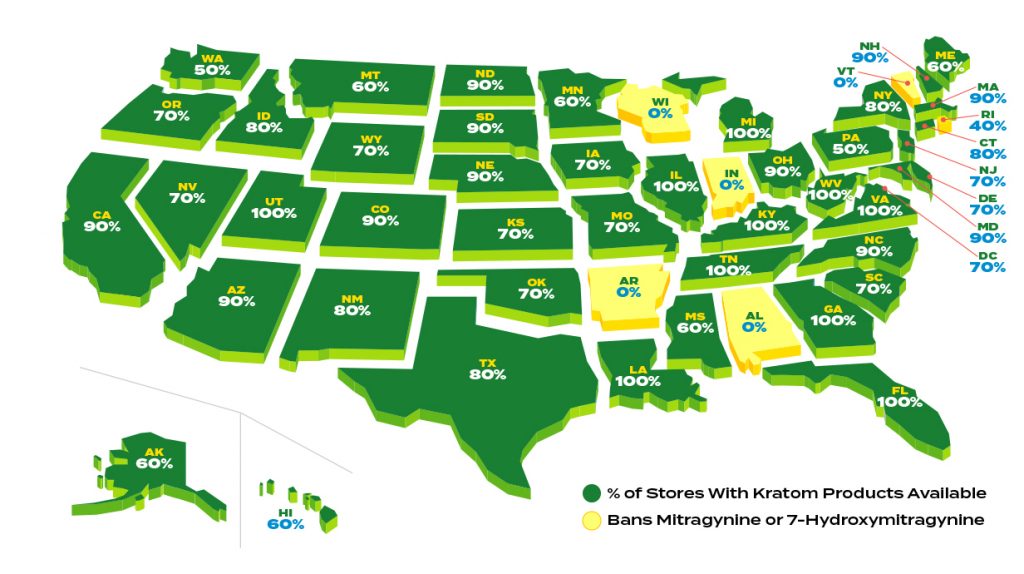
The availability of products containing kratom varies widely across the United States. A handful of states have outlawed kratom sales, and even in states that have not, many county and city governments have restricted or banned the product Graphic by John McCustion/University Marketing and Communications
University of Mississippi, North Texas researchers find kratom available at 72% of tobacco specialty stores
Nearly three-fourths of tobacco and vape stores in the United States sell an addictive, dangerous substance with connections to liver toxicity, seizures and death, according to a new study from the University of Mississippi.
That’s a key finding of a recent study on the availability of kratom, published in the American Journal of Public Health.
Kratom is a tree native to Southeast Asia and its leaves have been used as a stimulant and for pain management for hundreds of years. More than 2 million people in the United States use kratom annually.
The Drug Enforcement Administration briefly classified kratom as a Schedule I drug in 2016, but withdrew that action after public backlash. Several states have taken up the issue in local laws since, but there has been no federal action.
In Mississippi, more than 30 counties and cities have restricted or banned the product. The state legislature has debated several bills restricting the sale of kratom since 2021 but has yet to pass any legislation on the product.
“This product, it’s being marketed as being a mood stabilizer and painkiller, but then we also have several warnings from federal agencies and people who have died from overdoses,” said Andrew Yockey, UM assistant professor of public health.
“That is the disconnect, right? There are people who think this is a fantastic product, but it’s also linked to these poisonings and hospitalizations.
“So why are people using it? Because it’s so widely available. Ease of access is one of the biggest risk factors for substance use besides peer pressure.”
Matthew Rossheim, associate professor at the University of North Texas Health Science Center at Fort Worth, is leading the team of researchers on the project. He spoke with tellers and attendants at 520 tobacco and vape shops across the nation – 10 from each state and territory. He found that even in states where kratom is banned, many stores still sold it.
“I spent my nights and weekends for about three, four weeks making these calls and just asking,” Rossheim said. “What we found is that these products are widely available.”
In states where kratom is legal, more than 80% of tobacco and vape specialty stores reported selling it. In states where it is illegal – Alabama, Arkansas, Indiana, Vermont, Wisconsin, and Rhode Island – most stores reported not selling the substance.
But in Rhode Island, some 40% of the surveyed establishments reported selling the illegal supplement, the researchers said.
Concentrated extracts of the plant are marketed as remedies for a range of conditions.
“Kratom products are marketed or advertised as having various benefits from use, from therapeutic benefits to being stimulants or depressants, to pain relieving, to even being a substitute for opioids,” Rossheim said. “Because of the lack of scientific evidence, those are potentially deceptive claims.”
Researchers have linked kratom to liver toxicity, seizures, salmonella and other life-threatening conditions. The product is also highly addictive and has withdrawal symptoms.
The Centers for Disease Control and Prevention reported that at least 91 people died from kratom overdose between 2016 and 2017, the most recent period for which data is available.
Kratom is not an FDA-approved drug, nor is it recognized as a supplement. That means there is little or no oversight in its production, Yockey said.
“One of the biggest health things that we’re seeing is that these products are hitting the market without supervision,” he said. “And if there’s no supervision, do you really know what you’re putting in your system?”
By Clara Turnage






